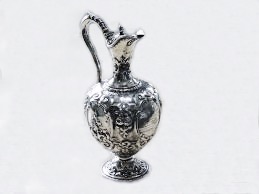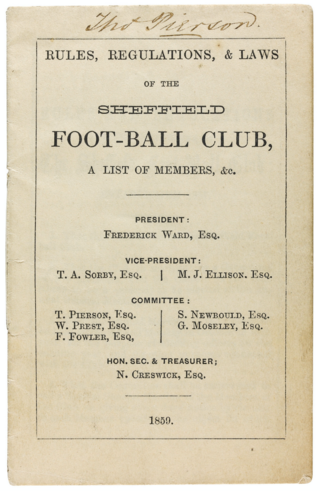The golden goal is a rule used in association football, rugby league, lacrosse, field hockey, and ice hockey to decide the winner of a match in which scores are equal at the end of normal time. It is a type of sudden death. Under this rule, the game ends when a goal or point is scored; the team that scores that goal or point during extra time is the winner. Introduced formally in 1993, though with some history before that, the rule ceased to apply to most FIFA-authorized football games in 2004. The similar silver goal supplemented the golden goal between 2002 and 2004.

Sheffield Wednesday Football Club is a professional association football club based in Sheffield, South Yorkshire, England. They compete in the EFL Championship, the second level of the English football league system.

The Youdan Football Cup, also known as the Youdan Cup, was an 1867 Sheffield rules football competition. Preceding the FA Cup by more than four years, it was among the first tournaments in any code of football.
Wanderers Football Club was an English association football club. It was founded as "Forest Football Club" in 1859 in Leytonstone. In 1864, it changed its name to "Wanderers", a reference to it never having a home stadium, instead playing at various locations in London and the surrounding area. Comprising mainly former pupils of the leading English public schools, Wanderers was one of the dominant teams in the early years of organised football and won the inaugural Football Association Challenge Cup in 1872. The club won the competition five times in total, including three in succession from 1876 to 1878, a feat which has been repeated only once.

The Sheffield and Hallamshire Football Association is a County Football Association in England. It was formed in Sheffield in 1867 as the Sheffield Football Association, and is the second-oldest football governing body after the Football Association (FA). Its teams adopted the Sheffield Rules of football until 1878, when they were merged with the FA's rules. Its members include the two oldest football clubs in the world, Sheffield and Hallam.

The Sheffield Rules was a code of football devised and played in the English city of Sheffield between 1858 and 1877. The rules were initially created and revised by Sheffield Football Club, with responsibility for the laws passing to the Sheffield Football Association upon that body's creation in 1867. The rules spread beyond the city boundaries to other clubs and associations in the north and midlands of England, making them one of the most popular forms of football during the 1860s and 1870s.

Charles William Alcock was an English sportsman, administrator, author and editor. He was a major instigator in the development of both international football and cricket, as well as being the creator of the FA Cup.
The following are events in the 1860s decade which are relevant to the development of association football. Included are events in closely related codes, such as the Sheffield Rules. All events happened in English football unless specified otherwise.

The history of Sheffield Wednesday F.C., an English football club from Sheffield, dates back to the club's establishment in 1867. The club would see early regional success followed by a rocky transition to professionalism. Although it has spent the majority of its Football League years in the top flight, its position within the league has varied from the very top to almost slipping to the fourth tier.
Heeley F.C. was an English association football club based in Sheffield, Yorkshire.

The 1878 FA Cup final was an association football match between Wanderers F.C. and Royal Engineers A.F.C. on 23 March 1878 at Kennington Oval in London. It was the seventh final of the world's oldest football competition, the Football Association Challenge Cup. Wanderers had won the Cup in the previous two seasons and on four previous occasions in total, including the first FA Cup final in 1872, in which they defeated the Engineers. The Engineers had also won the Cup, having defeated Old Etonians in the 1875 final.
Attercliffe Football Club was an English association football club based in Attercliffe, Sheffield, South Yorkshire.
Shropshire Wanderers F.C. was an amateur association football club based in Shrewsbury, England. The club was active during the 1870s and once reached the FA Cup semi-finals.
The 1867–68 Season was Sheffield Wednesday F.C.'s first season after being formed on 5 September 1867. For this first season of their existence "The Wednesday" as they were called played their home matches on an open field known as "high field" in the present Highfields area of Sheffield. The actual location of the ground was on Upper Colver Road which no longer exists but was situated on the present day site of the Highfields Library which stands near the junction of London Road and Abbeydale Road.
Lockwood Brothers F.C. was an English association football club based in Sheffield, Yorkshire.
Garrick Football Club was an English association football club based in Sheffield, Yorkshire.
Park Grange F.C. was an English association football club based in Sheffield, South Yorkshire.
Norfolk Football Club was an English football club based in the Norfolk Park suburb of Sheffield.
Derbyshire F.C., often referred to as Derby F.C., was an English association football club, based at the Derbyshire County Cricket Ground in Derby, England.

The 1876-77 Sheffield Senior Cup was the first edition of the tournament, played to Sheffield rules. It was the biggest tournament played to the Sheffield code and the equivalent of the FA Cup, which at the time was mostly confined to the south of England.








